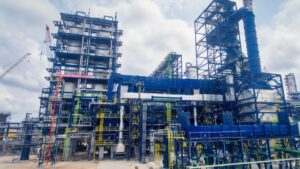
Nigeria should have over N11trn fuel subsidy savings by 2025 — World Bank
The World Bank has said that by 2025, Nigeria should have over N11 trillion saved from fuel subsidy removal. The World Bank provided this insight in the December 2023 Nigeria Development Update which is a bi-annual report which evaluates recent economic and social changes in Nigeria.
The World Bank report stated that the removal of the subsidy on fuel which came into effect on June 1, 2023, is expected to save the government around N2 trillion in 2023, which is about 0.9 percent of the country’s total economic output. Looking ahead, between 2023 and 2025, the anticipated savings could exceed N11 trillion compared to a scenario where the subsidy continued.
According to the Office of the Accountant General of the Federation (OAGF), the removal of the costly fuel subsidy did not result in as much increase in net oil revenues for the country as expected.
The subsidy used to cost about N380 billion monthly, and it was assumed that removing it would significantly boost the country’s oil revenues.
However, most of the reported revenue gains in the second half of 2023 were due to exchange rate improvements.
Without these gains, oil revenue from January to August would have dropped by 0.2 percent of the entire yearly economic output, mainly occurring between July and August.
In August, there was some additional revenue from production-sharing contracts (PSCs) and yearly dividends, but these gains did not match the expected benefits of removing the fuel subsidy.
As petrol prices have not adjusted in line with market factors like exchange rates and global oil prices, there is a risk of an implicit fuel subsidy re-emerging, potentially keeping oil revenues lower than anticipated.
The World Bank report stated that to restore macroeconomic stability in the country, the government needs to: “Reaffirm the commitment to not subsidise gasoline and ensure retail gasoline prices are consistent with this. Regularly publish information that explains prices at the pump.
“Publish detailed financial statements and revenue flows of the Nigerian National Petroleum Company Limited (NNPCL) to safeguard the fiscal savings from the subsidy reform and ensure that oil revenues flow to the Federation.”
According to the World Bank report, Nigeria’s oil production has slightly improved, showing a growth of 4.6 percent year-on-year during the initial nine months of 2023.
However, it’s important to note that this growth is still below the average monthly production before the pandemic, which was at 1.7 million barrels per day (mbpd).
Additionally, it falls short of Nigeria’s OPEC quota of 1.7 mbpd and the Federal Government’s estimated production level for the 2023 budget, set at 1.69 mbpd.
However, in 2024, Nigeria’s OPEC quota is 1.5 million barrels per day and the 2024 budget benchmark is 1.7 mbpd. In November 2023, the country produced 1.4 mbpd, inclusive of condensates production, after recording over 1.5 mbpd in September and October 2023.
According to the World Bank report, although oil production is expected to rise, exports might shrink due to oil prices anticipated to be about 20 percent lower than in 2022.



